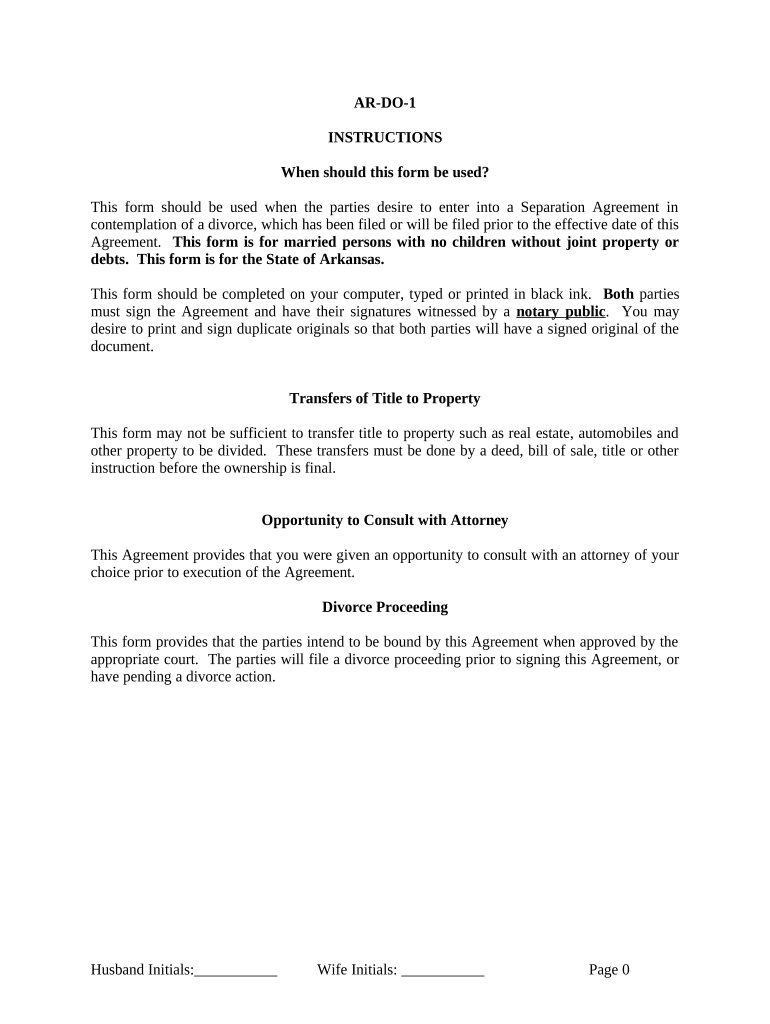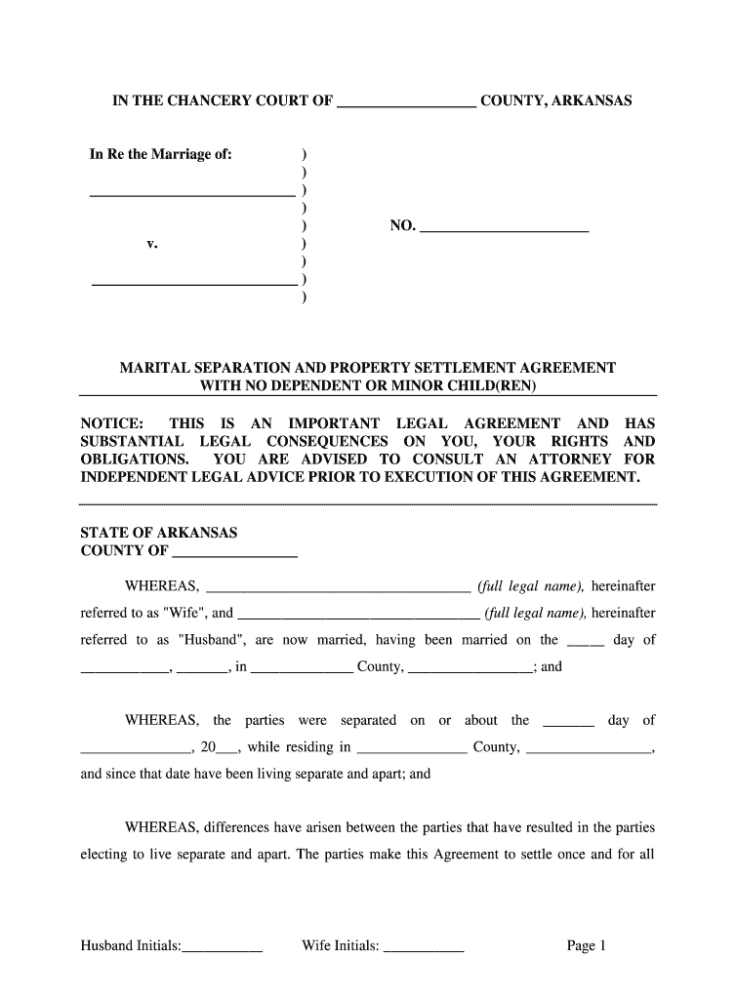Legal Guidelines for Separation in Arkansas
In Arkansas a legal separation can provide couples with a compromise when they aren’t quite ready to end their marriage but require some space. It’s akin to pressing the pause button on your relationship allowing both individuals to address matters or contemplate the future without completely cutting legal connections.
From what I’ve witnessed some individuals opt for separation to navigate their lives while keeping the door open for potential reconciliation. It’s a choice, but it can offer insights and a framework for handling personal and financial issues during a difficult period.
A legal separation is a way for you and your partner to live separately while still being married in the eyes of the law. It’s different from getting a divorce because you still have certain obligations towards each other. However you can handle matters such as dividing assets, custody arrangements and financial support while living apart.
A lot of people opt for this path as it provides a means to retain specific advantages like health insurance protection that could be at risk during a divorce. Additionally it enables partners to tackle matters such as asset distribution and child custody arrangements while still being married.
Key Differences Between Legal Separation and Divorce

It is important to grasp the difference between legal separation and divorce. Although both involve matters such as splitting assets and determining custody arrangements for children they yield different results and consequences.
Here are the key differences:
- Legal Status: In a legal separation, you remain married legally, whereas divorce legally ends the marriage.
- Financial Benefits: Separation allows you to retain benefits like health insurance that might end with divorce.
- Finality: Divorce is a permanent end to the marriage, while separation is a temporary arrangement with the possibility of reconciliation.
- Impact on Taxes: Separated couples may still file taxes jointly, unlike divorced individuals who must file separately.
Based on what Ive seen some couples feel that getting legally separated allows them to have the breathing room to address their problems while still maintaining their family unit. It can provide relief both emotionally and financially giving them the opportunity to handle choices without rushing into a divorce.
Legal Requirements for Separation in Arkansas

In order to seek a separation in Arkansas specific criteria need to be fulfilled. This process guarantees that both individuals involved are treated justly and that all essential legal issues are taken care of.
Here are the key requirements:
- Residency: At least one spouse must be a resident of Arkansas for at least 60 days before filing.
- Grounds for Separation: Arkansas doesn’t require specific grounds for separation, but you must file a petition in court detailing your reasons for seeking separation.
- Child Support and Custody: If you have children, you will need to address child custody and support arrangements, which the court will review to ensure they serve the best interests of the child.
- Property Division: You’ll need to outline how you plan to divide marital property and debts. This can be negotiated or decided by the court if an agreement can’t be reached.
I think it can be overwhelming to deal with these requirements. However having a solid grasp of the situation and a well thought out plan can ease the journey. Seeking advice from a lawyer can offer support and help ensure that all legal matters are taken care of properly bringing comfort during a difficult period.
Property and Debt Division During Separation

When two people part ways figuring out how to split their belongings and financial obligations can be quite a challenge. It goes beyond deciding who keeps the house or the car; it involves finding a balance between fairness and practicality. This aspect of the separation journey tends to stir up emotions and having a clear grasp of the guidelines can help ease the burden.
In Arkansas figuring out how to split up property and debts when separating requires several key steps.
- Identifying Marital Property: This includes all assets acquired during the marriage, such as homes, cars, and bank accounts. Each partner has a right to a fair share of these assets.
- Classifying Property: Property is classified as either marital or separate. Marital property is divided between spouses, while separate property (like gifts or inheritances) typically remains with the original owner.
- Debt Allocation: Debts incurred during the marriage, such as credit card balances or loans, are generally divided equally. However, debts in one spouse’s name alone might be their responsibility.
From what I’ve seen talking about these matters openly and truthfully with your partner can result in a smoother resolution. It’s usually helpful to involve a mediator or legal expert to make sure everything is handled fairly and both sides are content with the result.
Child Custody and Support Considerations
When it comes to separation matters like child custody and support can be particularly charged with emotions. It can be tough to prioritize your childrens well being during such transitions but familiarizing yourself with the legal aspects can offer some solace.
Here’s what you should be aware of regarding child custody and support matters in Arkansas.
- Custody Arrangements: Arkansas courts prioritize the best interests of the child when making custody decisions. This includes considering factors like the child’s relationship with each parent and each parent’s ability to provide care.
- Types of Custody: Custody can be physical (where the child lives) or legal (who makes important decisions about the child). Parents can have joint or sole custody arrangements.
- Child Support: Child support is calculated based on both parents’ income and the needs of the child. Arkansas uses a formula to ensure fair support payments that cover living expenses, education, and healthcare.
In my view it’s essential to prioritize the needs of the child and keep lines of communication open with your co parent. Seeking assistance from a family law attorney can be beneficial in addressing these matters and ensuring that your childs well being is always the foremost concern.
Spousal Support and Alimony Guidelines
Spousal support commonly known as alimony plays a role in the separation process by assisting one spouse in keeping a lifestyle similar to what they enjoyed during the marriage. This matter is intricate and necessitates thoughtfulness as well as a grasp of the legal framework involved.
In Arkansas the determination of spousal support takes into account various factors such as
- Financial Need: The court evaluates the financial needs of the spouse requesting support and the ability of the other spouse to provide it.
- Duration of the Marriage: Longer marriages might result in higher or more extended support payments compared to shorter ones.
- Standard of Living: The court considers the standard of living during the marriage and aims to provide support that helps maintain a similar quality of life.
- Contributions to the Marriage: Contributions such as homemaking and supporting the other spouse’s career are considered in the support decision.
Based on what I’ve seen negotiating spousal support can be a delicate matter. It’s important to handle these conversations with compassion and sensitivity. Seeking advice from a lawyer can assist in navigating the challenges and ensuring that the support agreements are equitable and just for both parties.
How to File for Legal Separation
Initiating a separation in Arkansas involves a procedure that demands thorough planning and comprehension of the necessary steps. Its a process that starts with important choices and concludes with an official separation. If youre contemplating this route here is a simple roadmap to assist you in navigating the process seamlessly.
Here’s a guide on how to initiate the process of legal separation.
- Prepare Your Documents: Gather necessary documents, including financial statements, details of assets and debts, and any relevant information about your marriage.
- File a Petition: Submit a petition for legal separation to the circuit court in the county where you or your spouse resides. This document outlines your reasons for seeking separation and your proposed arrangements for property, debts, and children.
- Serve the Petition: After filing, you must serve a copy of the petition to your spouse. This informs them of your request and provides an opportunity to respond.
- Attend a Hearing: A court hearing may be scheduled to review your petition and discuss any disagreements. Be prepared to present your case and provide evidence supporting your requests.
- Receive a Court Order: If the court approves your petition, you’ll receive a legal separation order. This order will detail the terms of your separation, including property division, custody arrangements, and financial support.
Based on what I’ve gone through, the process of filing for separation can be overwhelming. However breaking it down into steps and getting guidance can help make it more manageable. Knowing what to anticipate can lighten the emotional and legal load allowing you to concentrate on moving ahead.
Steps to Take After Filing for Separation
After filing for separation there are a few key actions to follow to make sure everything is handled correctly and you stay compliant with the law. This time is vital for establishing your new living situation and making necessary changes in your life.
Here’s what you should do after filing:
- Follow the Court’s Orders: Adhere to any temporary orders issued by the court, including custody arrangements and financial support. These orders are crucial for maintaining stability during the separation process.
- Update Financial Accounts: Separate your finances by opening individual bank accounts and updating your financial records. This helps manage your money separately and prepares you for potential changes in financial obligations.
- Adjust Your Living Arrangements: If you haven’t already, make necessary changes to your living situation. This might involve moving to a new home or rearranging your household responsibilities.
- Communicate with Your Spouse: Maintain open lines of communication with your spouse regarding the terms of the separation and any changes that may arise. This can help prevent misunderstandings and conflicts.
- Seek Professional Guidance: Consulting with a lawyer or mediator can help you navigate any legal or emotional issues that arise during this period. Professional guidance ensures that you meet all legal obligations and handle the separation effectively.
In my opinion these steps may pose difficulties but they are crucial for ensuring a seamless transition. By taking actions and reaching out for assistance you can ease the process and better adapt to your new situation.
FAQs About Legal Separation in Arkansas
Going through a separation can bring up a lot of questions and worries, especially if it’s your first time dealing with it. Here are some frequently asked questions that can shed light on the situation and assist you in grasping the process more clearly.
- What is the difference between legal separation and divorce? Legal separation allows you to live apart while remaining legally married, whereas divorce ends the marriage legally and permanently.
- Can I remarry if I am legally separated? No, you cannot remarry while you are legally separated. You must finalize a divorce to legally marry someone else.
- How is child support calculated? Child support is calculated based on both parents’ incomes, the needs of the child, and Arkansas’s child support guidelines. The court uses a formula to ensure fair support payments.
- Do I need a lawyer to file for legal separation? While it’s not mandatory, having a lawyer can help ensure that all legal aspects are properly addressed and that your interests are protected.
- How long does the legal separation process take? The duration can vary depending on the complexity of the case and any disagreements between spouses. Generally, it can take several months to complete the process.
Based on what I’ve seen dealing with these inquiries and finding straightforward responses can help simplify and ease the journey of going through a separation. Having a good grasp of your entitlements and obligations during this period is always beneficial.
Conclusion on Legal Separation in Arkansas
In Arkansas legal separation provides couples with a chance to take a step back while still keeping the door open for reconciliation. It allows individuals to tackle important matters such as dividing property, determining child custody arrangements and addressing financial support without completely ending their marriage. From my viewpoint going through this process with clarity and assistance can make it feel less overwhelming. Whether you’re looking for a breather to navigate personal challenges or seeking an organized approach to manage your separation legal separation offers a framework to navigate these changes. It’s essential to approach it with an attitude and seek guidance from professionals to ensure that everything is handled, fairly and respectfully.


